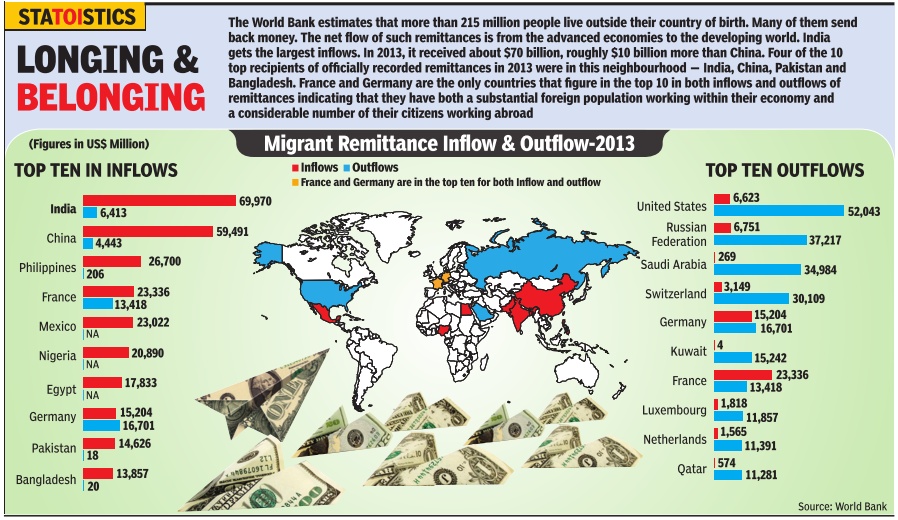Remittances: South Asia
This is a collection of articles archived for the excellence of their content. |
BRIDGING THE GULF The Times of India Dec 01 2014
India gets the highest amount of remittances in the world at roughly $70 billion, almost three times the amount of FDI that comes into the country. Where does all this money come from? Data shows that the bulk of remittances come from three different categories of countries: Middle Eastern monarchies such as Qatar, Western developed nations such as the US or Australia, and next door neighbors such as Bangladesh and Nepal. By far the largest amount comes from the Gulf countries -Qatar, Bahrain, Oman, Saudi Arabia, and Kuwait -which sent a combined $32.7 billion, almost half of all remittances received.
Migrant remittances: 2013

Outward remittance norms,2015:Overseas house purchases
Feb 05 2015
RBI's new remittance norm: No tax breaks may hit overseas home buys
Lubna Kably
The Reserve Bank of India's (RBI's) recent move, which doubled overseas remittances for individuals up to $2,50,000 (Rs 1.5 crore) per individual per year, may tempt many to buy property overseas. Today , property prices in Dubai and some areas in the United States are attractive for Indian investors.A cursory glance at a few international property portals shows that a one-bedroom house in Dubai costs upwards of 9,50,000 UAE dirhams, or Rs 1.5 crore approximately . In Boston, USA, a similar-sized flat is available for $1,50,000 (upwards of Rs 90 lakh). These prices fall well within the now enhanced permissible remittance figures. However, tax professionals caution that buyers who wish to sell their house property or other assets in India (for instance, a shop or even jewellery) and reinvest the long-term capital gains in a residential property overseas should note that tax exemptions are no longer available for such reinvestments.
Sections 54 and 54F, which earlier permitted investors to claim a capital gains tax exemption even if the reinvestment was in a house property overseas, was amended by last year's Budget -effective from April 1, 2014.
Prior to this amendment, section 54 provided that, where capital gains arise from the transfer of a residential house (held for three years or more) and the tax payer reinvests the capital gains in a new residential house whether by way of purchase or construction within a certain period, the capital gains to the extent re-invested would be exempt.
Section 54F provided for similar exemptions for long term capital gains arising on sale of assets other than a residential property .
Thus, earlier, there was no explicit bar on capital gains being denied if the capital gains were re-invested in a residential house overseas. “Even tax tribunals had upheld the tax benefits in cases where re-investments were made in a house overseas. For instance, in the case of Vinay Mishra, a tax payer who had reinvested in a house property in Singapore, the Bangalore tax tribunal had held that the claim under section 54 could not be rejected. It had also added that the tax payer had not violated the law by purchasing the new house in Singapore utilizing the consideration on sale of his residential house in India. Subsequently, the Chennai tax tribunal also took a similar view. However, the amendment to the tax law by the Finance Act, 2014, has overturned these decisions,“ explains Sonu Iyer, tax partner at EY.
The Finance Bill, 2014 (providing for tax provisions applicable for the financial year April 1, 2014 to March 31, 2015) was tabled in the Parliament on July 10, 2014. As of this date, RBI's liberalized remittance scheme prohibited individuals from remitting money overseas for purchase of property .Thus, the amendment in the Income Tax Act of prohibiting capital gains exemption on reinvestment in a house property overseas had little or no adverse impact.
“With the RBI now doubling the remittance figure, and overseas property proving to be attractive, investors are hoping for a tax break. The forthcoming Budget should consider this issue and re-introduce tax breaks on reinvestment in a house property overseas,“ says Naushad Panjwani, senior executive director, Knight Frank India.
